I would like to think that 2004's Deus Vult (as well as its development Hell sequel, Deus Vult II) has left a profound influence in its wake. I remember when I was first getting back into Doom and I was held enraptured by gameplay videos, watching the player's never-ending confrontation against overwhelming odds in wondrously imaginative environments tempered with shades of author amusement. I wanted to play Doom until I could at least get by these levels on Ultra-Violence and experience them on their own terms. I'd prefer to think I've gotten my stripes after playing through the works of authors like dannebubinga and Ribbiks; in fact, I suspect that I may have overshot my goal by several leaps and bounds.
Deus Vult actually has a story, a short blurb to set the scene. It's set on Deimos, presumably during Hell's initial invasion through the Martian lunar gateways. You're stationed in the last bastion of the UAC's marine contingent as it comes under assault from Hell and its corrupting influence. You stand alone (unless you're playing in co-op) as the final rock left to break the teeming tidal attack. It's a desperate last stand, ultimately resulting in the destruction of the demonic hordes from the inside out having choked on the most bitter pill possible - as long as you survive. If the title is any indication, though, God wills it.
Huy Pham's presentation is unusual. Deus Vult was originally one large level but the author divided it into four successive pieces with their own soundtrack selections - MAP01 through MAP04 - while releasing the whole composition as MAP05. He broke the level apart as an artistic compromise for players who did not enjoy "large" maps or did not have a powerful enough computer to play the entire thing while leaving the whole for those looking for a contiguous epic. You may know that the original Deus Vult was folded into Deus Vult II as an optional climax accessed through "Saint Peter's Gate" (MAP29). I decided to tackle the original release because the difference between the four and the single is a novel enough concept since it breaks the map into isolated segments, making them easier to talk about and also having a slightly different feel due to the parceled out soundtrack. Of course, I could just do the same thing myself using IDMUS.
The author has a long list of influences but as far as PWADs go there are four big names that come up. One of them isn't even mentioned in any official capacity and were it not for the handy DoomWiki article it might have taken me a lifetime to first play it and then realize the link. I am of course speaking about 1SQUARES, a proto-slaughter PWAD with a grid / room arrangement. The base resemblance to the opening Deimos installation is uncanny, down to the north arch-vile denial cage turning into a laser-prison. I'd also like to mention the configuration of the final encounter with the outer ring of Cyberdemons and arch-vile posts (only really conquerable via the proffered invul spheres) which seems a similar spirit to Deus Vult's more calibrated slaughterfests.
Nuts appears to be a somewhat tongue in cheek reference. The sheer spectacle of its slaughter clearly impacted the densest encounters of Deus Vult, most notably the clusterfuck on the floor of the "Cathedral", but I believe that its main influence was in showing the potential of limit-removing ports over continuing to squeeze blood out of the original executable. There's also the distinct possibility that B.P.R.D.'s "1st Anniversary Gold Plated Plutonic Aloy Coated Eight Volume Nuclear Donkey Edition of Nuts.wad" (aka Nuts 2) tickled Huy enough to include the multitude of joke / secret areas. These are all attributed to Ralphis / Shadowrunner in spirit but I'd like to think that authors such as B.P.R.D. help people feel safe enough to crack a smile in their Doom WADs.
Huy's sense of aesthetics appears to be a cross between Hell Revealed's enormous scale and Alien Vendetta's painstaking architecture and detailing. The combination would not be possible were it not for Pham's embrace of limit-removing source ports. I imagine a very different topographic terror of "Torture Chamber" or cavernous "Cathedral" had he not. The author specifically mentions two levels from Alien Vendetta. "Fire Walk With Me" is clearly evident in Deus Vult's second half where much of the connective tissue is composed of similarly volcanic channels on top of using the same music (Heretic's E1M4) for MAP03, building on the revenants-in-curved tunnel set piece encounter, and having its own Hellmouth.
Pham has done a ton of work in making Deus Vult look stunning every step of the way, whether it's the atmospheric lighting of the Deimos outpost or the multitude of alcoves in "Torture Chamber" leaving the impression of an infinitude of tunnels just beyond the Stygian cistern containing an equally incalculable supply of Hellspawn. The eponymous cathedral of MAP03 is another eye-popping ensconcement featuring an enclave of enshrined evils both historical and fictional. Its portraiture and action would be driven to cartoonish excess when combined with a layout also evocative of 1SQUARES in Deus Vult II's "Hell's Vendetta". I don't mean to imply for you to take Deus Vult seriously, of course, and how can you when the Eye of Sauron in MAP02 turns out not to be a mere set piece but foreshadowing the final conflict where the last sanctum serves as a memorial to the One Ring?
The other recorded Alien Vendetta influence is the iconic "Misri Halek", one of my favorite adventure levels. The sense of adventure is a potential element in Doom WADs and maps that utilize it fall on a spectrum spanning between two poles. On one end are works which are non-linear or even sandbox-like in design and oriented toward exploration, sometimes involving meticulously constructed and detailed environments. The other slides toward maps dominated by linear flow and drawing the player through using their encounter design and similarly interesting visuals. "Misri Halek" and Deus Vult are planted firmly on the second end of the line and while Malde's masterpiece is not about the slaughter DV parallels it beginning with a series of moodily lit orthogonal chambers before the character of the man-made structures gives way to a crack in the universe leading you straight to Hell. The comparison gets a little dicey afterward but I'd be surprised if the big stair climb wasn't partly derived from the Cyberdemon junction in "Halek".
I think that the gameplay of slaughter is naturally complementary to linear adventure levels. Authors are free to build up as much window dressing as desired to make up the eye-popping encroachments and since the focus is on the encounters the player relies on the extravagance of the action for their immersion rather than the plausibility of the map's progression, eclipsing a need for aspirations toward non-linearity, or an appeal to atmosphere. The latter can be such a fickle component so it's to Pham's advantage that he wades into the thick of it at the onset beating on his Vrack drum, leaving zero ambiguity to where your journey will take you. Players either quickly quit in distaste or press on and move toward the subsequent scintillating spectacles. Some might even make a cheeky mega-slaughter level and similarly bust it into four pieces while drawing more from Hell Revealed than Alien Vendetta. If you didn't know, the last one is Holy Hell, apparently made by the enigmatic author behind Impossible: A New Reality.
Deus Vult's combat derives influence from perennial favorites Hell Revealed and Alien Vendetta. Of course, the latter was largely inspired by the former while thankfully avoiding carbon copy status and Pham manages to carve out his own particular niche in the slaughterfest shrine. The pacing may seem deceptive since the uncorrupted portions of the Deimos base make for a fairly sedate beginning. It isn't until you're inundated in imps that you start to get a feel for what's in store for you but it barely hints at the difficulty of the second half of "Insurgents" let alone the other three-quarters of the WAD. Whatever you may think when you get to the imp encounter, realize that Huy steadily raises the bar with every battle.
The good news: All of the raw skills required to complete Deus Vult are introduced and exercised up through the watershed of "Torture Chamber". The demon fight is a decent warm-up, even better if you utilize the Berserk pack which requires you to be more observant of being overwhelmed since you're only keeping them at arm's length. The second introduces hitscanners and the third some significant hardbodies in the mancubuses while still giving you room enough to cheese the fight. Not so much when the imps come calling since the multi-pronged invasion is far more likely to drown a careless player. The storage room ups the ante with its sizable lock-in ambush forcing you into congested combat while betwixt a cacodemon trio and a percolating prison cell. It's thankfully bereft of the arch-viles it would normally have contained in 1SQUARES.
From here you move on to the first really open air fight, the nukage pool. All of the monsters in the peripheral galleries are dangerous but you've got to be mindful of the center as its regular arrival of commandos and other beasties pose an immediate threat. It isn't so easy as circle-strafing but it's a much simpler fight than its evil twin appearing as the penultimate big brawl in "End of Days". The southbound tunnel gives you a taste of Deus Vult's incidental battles with its surprise skeletons lurking in the cracks and gets you used to really ugly blind drops when you fall into the fissure separating the tunnel from marble mayhem. It's a recurring motif, the biggest instance being the plummet into "Torture Chamber". Another powerful punch lurks at the end of the cherry-red tunnel in "Cathedral".
Speaking of MAP03, Hell's stately reception room in MAP01 serves as an early template and an introduction to Pham's predilection toward invul-fed slaughter down to the lift-accessed columns. You won't be able to make it without exploiting the most you can from both spheres to slay as many monsters as you can while being physically overwhelmed so that you have a little space to breathe in once the artifacts wear off. The next room serves as a brain teaser to courts you into the proper mindset for hunting Huy's secrets (he is obviously keen to show them off) with a pillar and shoot switch mechanism. It isn't exactly arcane but it's a fair departure from previous rooms. At this point you've got a big build-up to a crowd of Cyberdemons. You can make the fight easier with careful resource management but it has no simple solution much like similar moments in the upper "Cathedral" floor and the lava tube leading to the final fight in "End of Days".
The secret sniffing pays off with the switch at the top since it's the only way to conquer another army of Cyberdemons, this one by way of telefrags which the author uses to mercifully nullify hard to kill or reach obstacles that appear in the first two portions. As previously mentioned, the next step is down into "Torture Chamber" which places you in a hornet's nest type situation where you're forced to be cautious in how you move around the cavern lest you be exposed to any one of a multitude of area denial monsters. These are mostly arch-viles but also consist of platforms mobbed by revenants and Barons as well as a few Cyberdemons. When I played MAP02 I felt shades of Hell Revealed's "Post Mortem" but it's far more forgiving especially since Huy Pham's adventure sensibilities give you a fairly easy to reach tunnel segment trading egregious exposure for claustrophobic caverns and which eventually awards you with the BFG and an invul sphere as your starting point for making the ground floor safe. "Torture Chamber" is sort of an opposite to DV's encounter progression since it's the most complex danger room scenario to be found compared to the ones that follow but you'll be better prepared for picking your way through the second half.
Make no mistake, though: Deus Vult is hard. Not as challenging perhaps as the high skill ceiling maps of today, which draw influence from Death-Destiny and Sunder (and people influenced by D-D/S), but I think that it definitely starts to bridge the gap from predominantly vanilla-oriented slaughtermaps including its contemporary Hell Revealed II to present day notions of difficulty as bolstered by limit-removing source ports. In spite of all the monsters I don't think of it as grindy and while you are forced to use invul artifacts in several fights the order in which you pursue them and the way you spend your time in between the timers is left up to you. I rarely get a sense of highly exacting encounter choreography featured in the arch-vile halo from Sunlust's "Go Fuck Yourself". I'm more inclined to roll my eyes at minefield moments like the climb to the final lava channel in MAP04 where you pull dragon's teeth with the BFG.
Huy Pham cemented his place in the Doom community's history by crafting an entry that's equal parts exhilarating, challenging, and enthralling. Though I look forward to playing Deus Vult II whatever its current criticisms may be I'm hoping the author finds enough interest to fill out the rest of its slots with equally inspired installations. In the mean time, here's thanks for an amazing journey.


DEUS VULT
by Huy Pham
by Huy Pham
| Insurgents | MAP01 |
|---|---|
| Starting off in a relatively clean UAC base that brings Sverre's Eternal Doom levels to mind. As you journey to the East, though - always to the East - you'll follow the root of demonic corruption down to its source. The early parts of the level descended from 1SQUARES work pretty well to warm you up and the slowly opening shutters make it feel like the base is on lockdown. The imp assault is a great taste of what's to come. The metal / poison pit is a nice transition point between the clean Vrack-like squares and the cracked corruption. I enjoy how it steps counter to the cramped fights, featuring a dangerous ball of fury in the center and periphery enemies demanding your respect. The first marble area gives you an idea of Deus Vult's ridiculous scale in creating a flood of monsters that you must outlast with the first invul sphere long enough to clear the space where you can maneuver and grab the second to clean up. The crossroads at the gates of Hell is a cool adventure moment because of the gyrations required to open the gate to the ominous blood stair, descended perhaps of "Misri Halek" and also serving as the final break from 1SQUARES. Given its reputation I was looking for a shortcut through the Cyberdemon cavalcade but it's a real force of will fight and you can only soften it using the plasma gun. I appreciate Huy's method of cutting down the cinematic Cyberdemon surprise as well as the couple of other secrets sequestered within, including Jar Jar looking for his last pineapple fritter. | 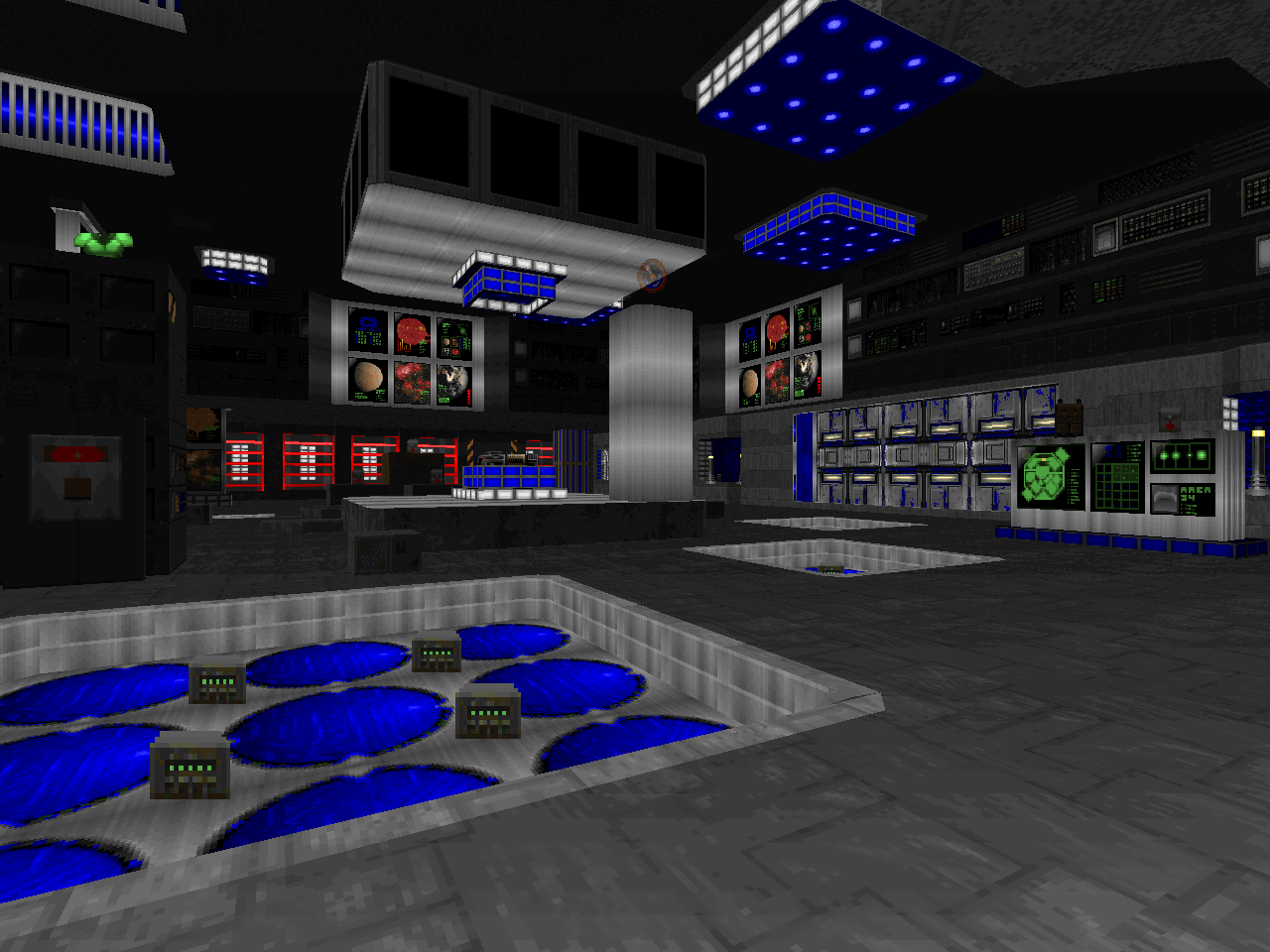 |
ONE WAD TO RULE THEM ALL, ONE WAD TO FIND THEM,
ONE WAD TO BRING THEM ALL AND IN THE DARKNESS BIND THEM
ONE WAD TO BRING THEM ALL AND IN THE DARKNESS BIND THEM
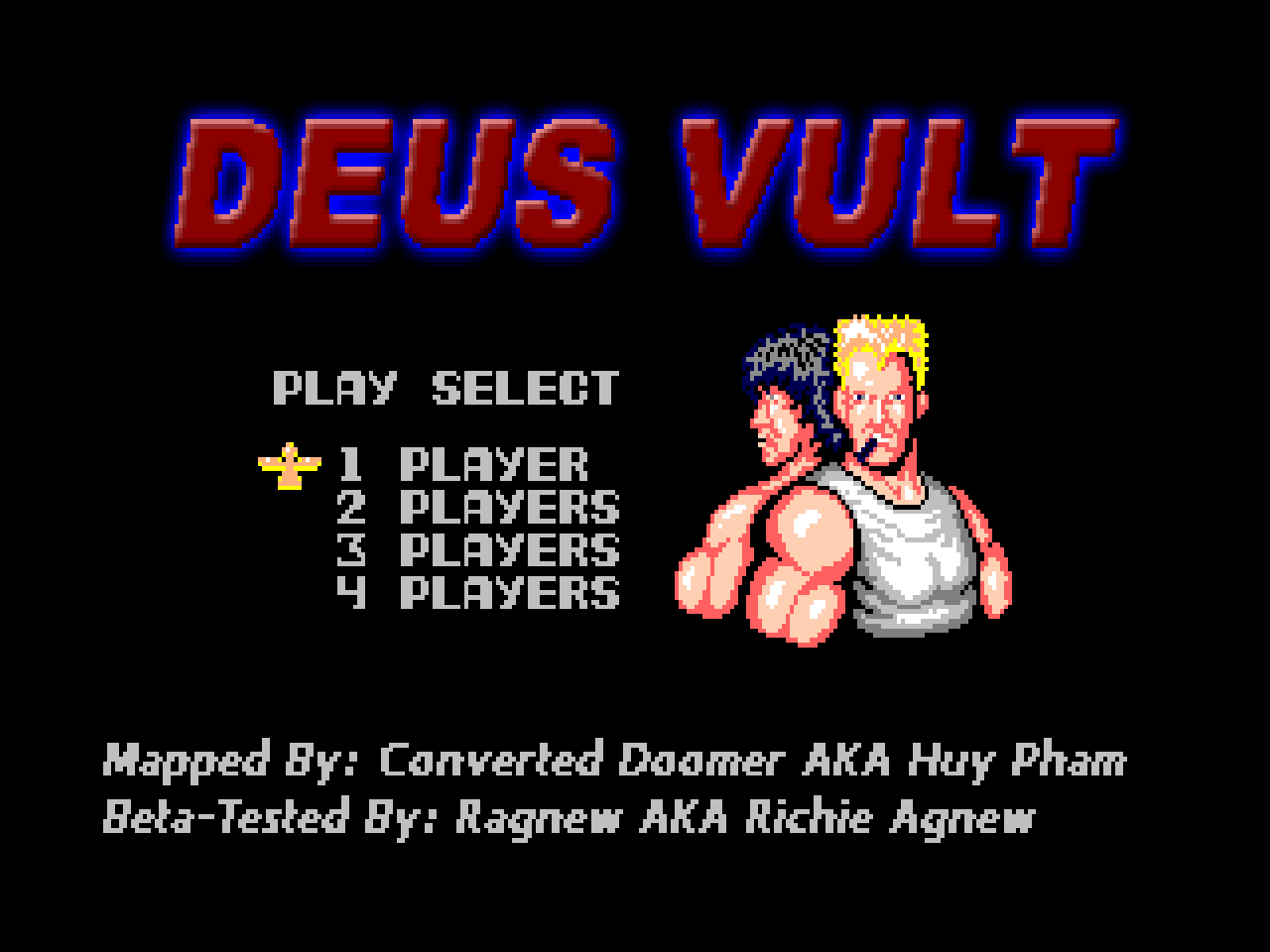
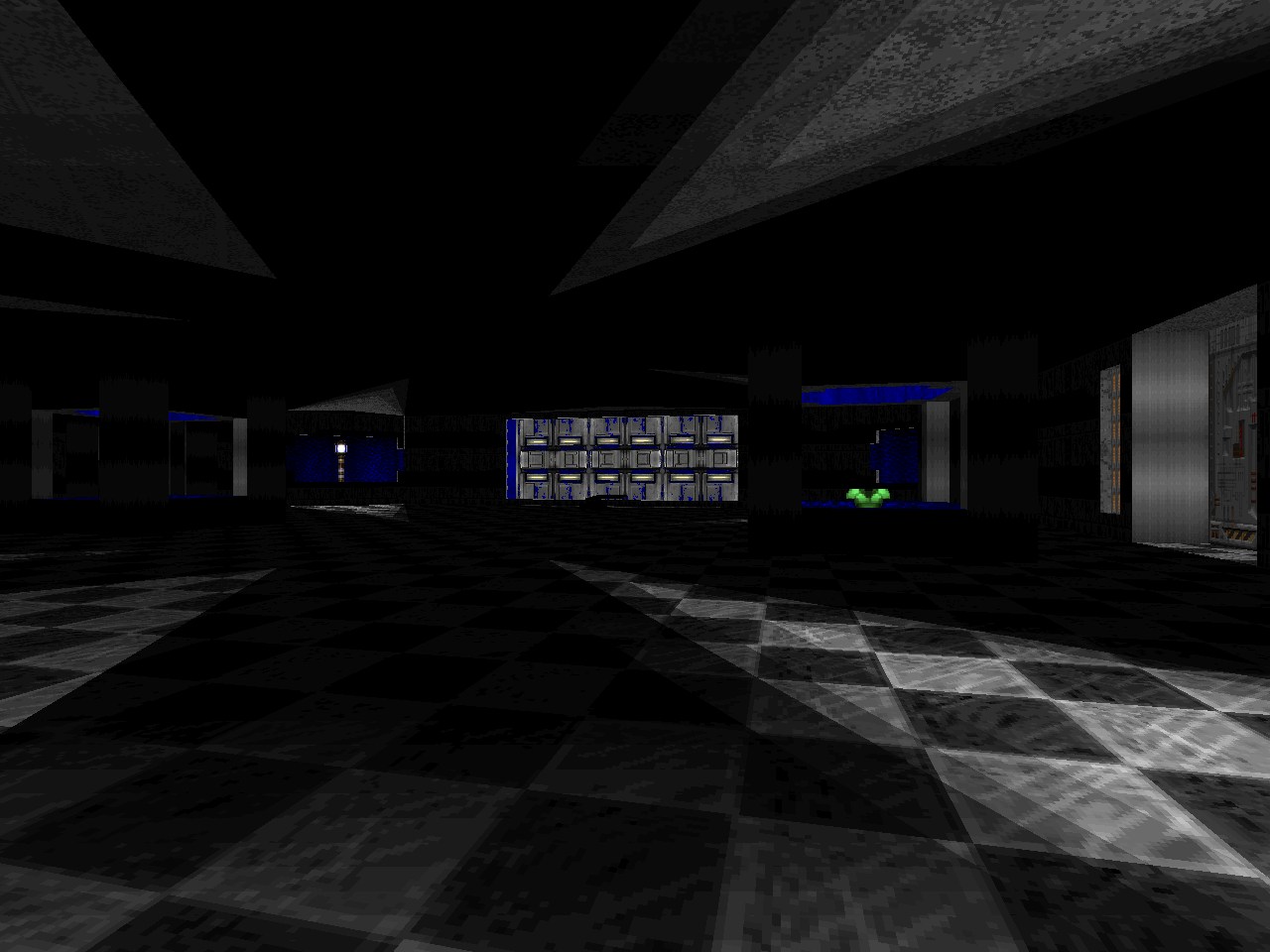
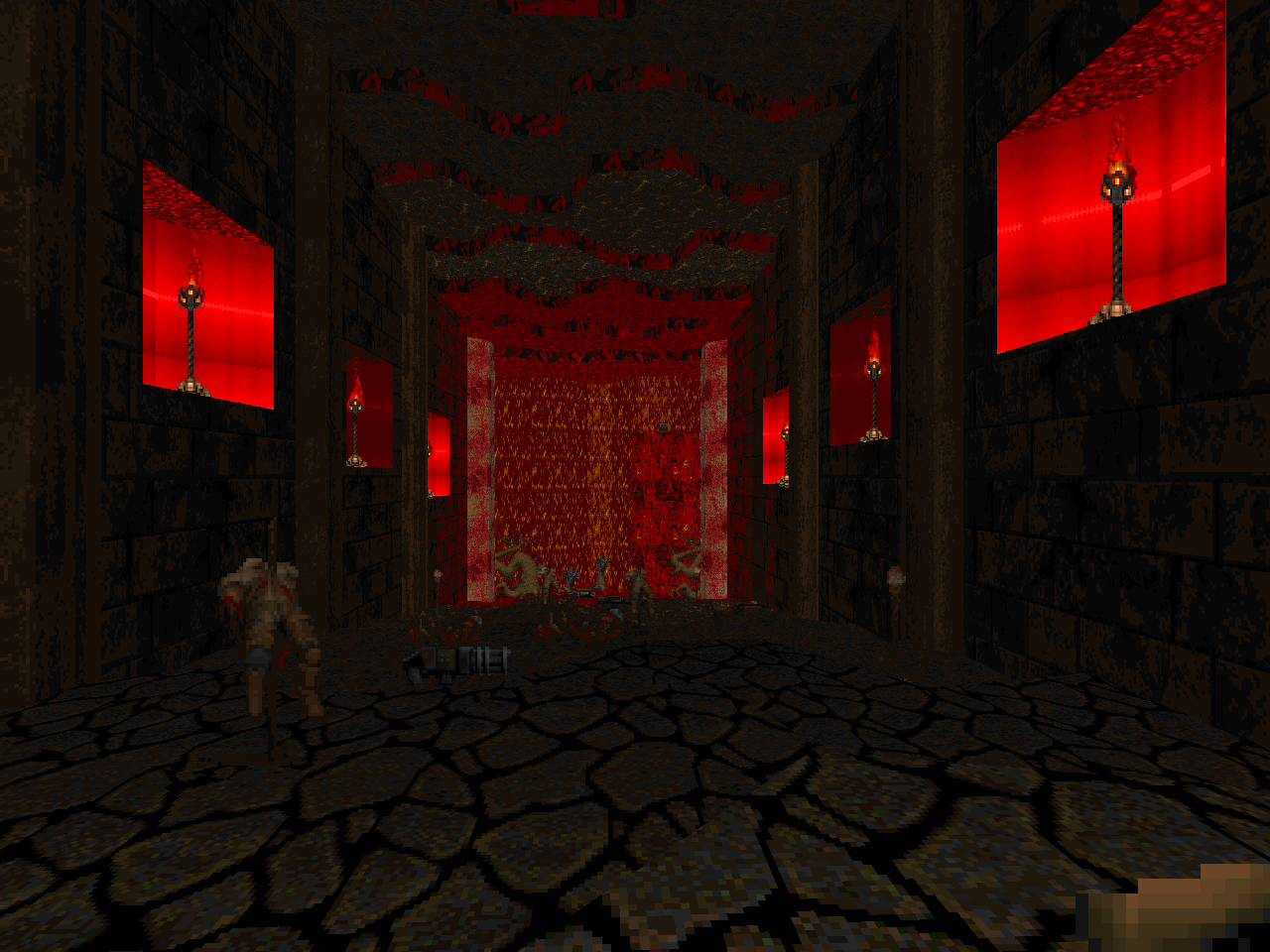

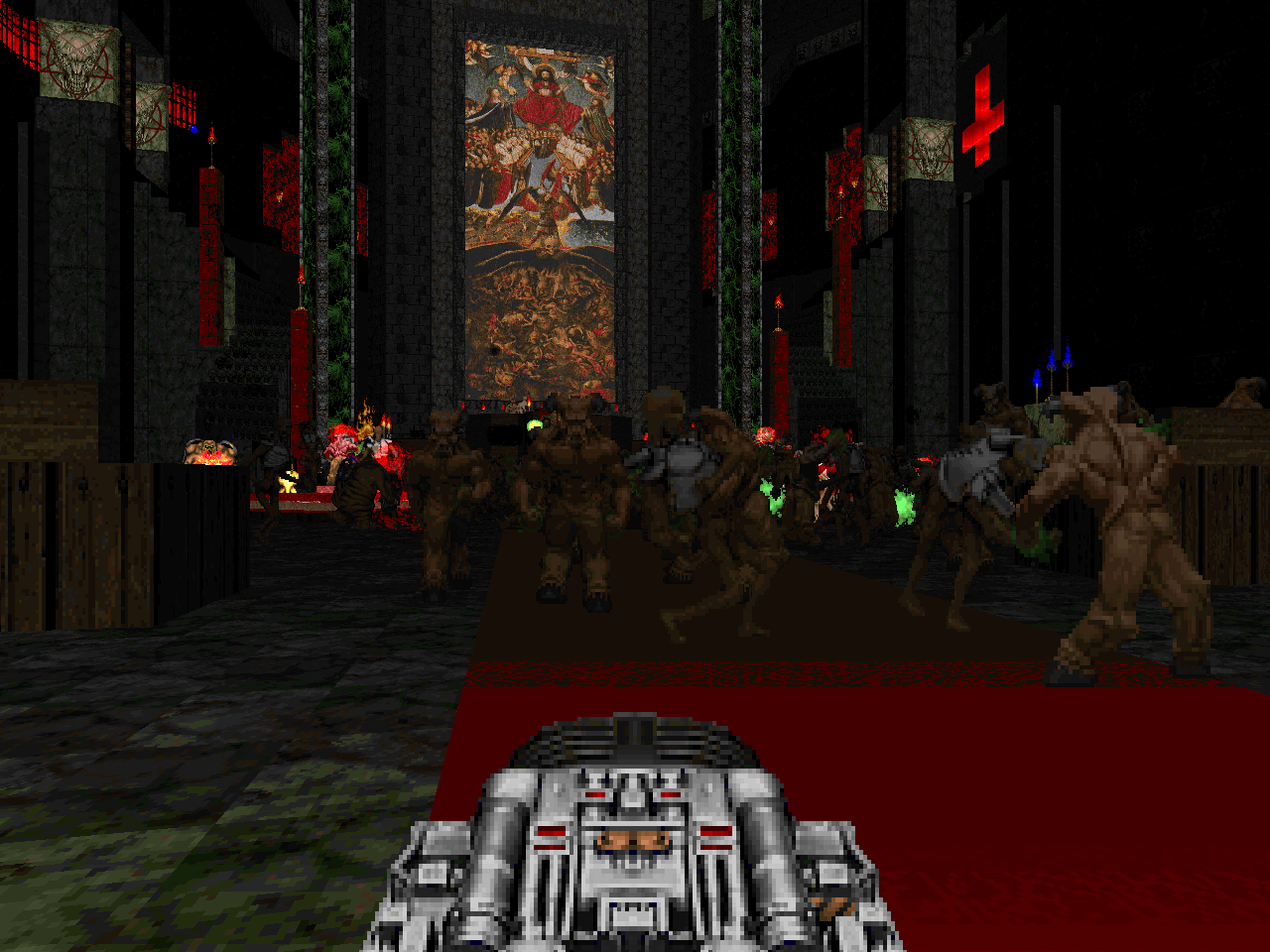
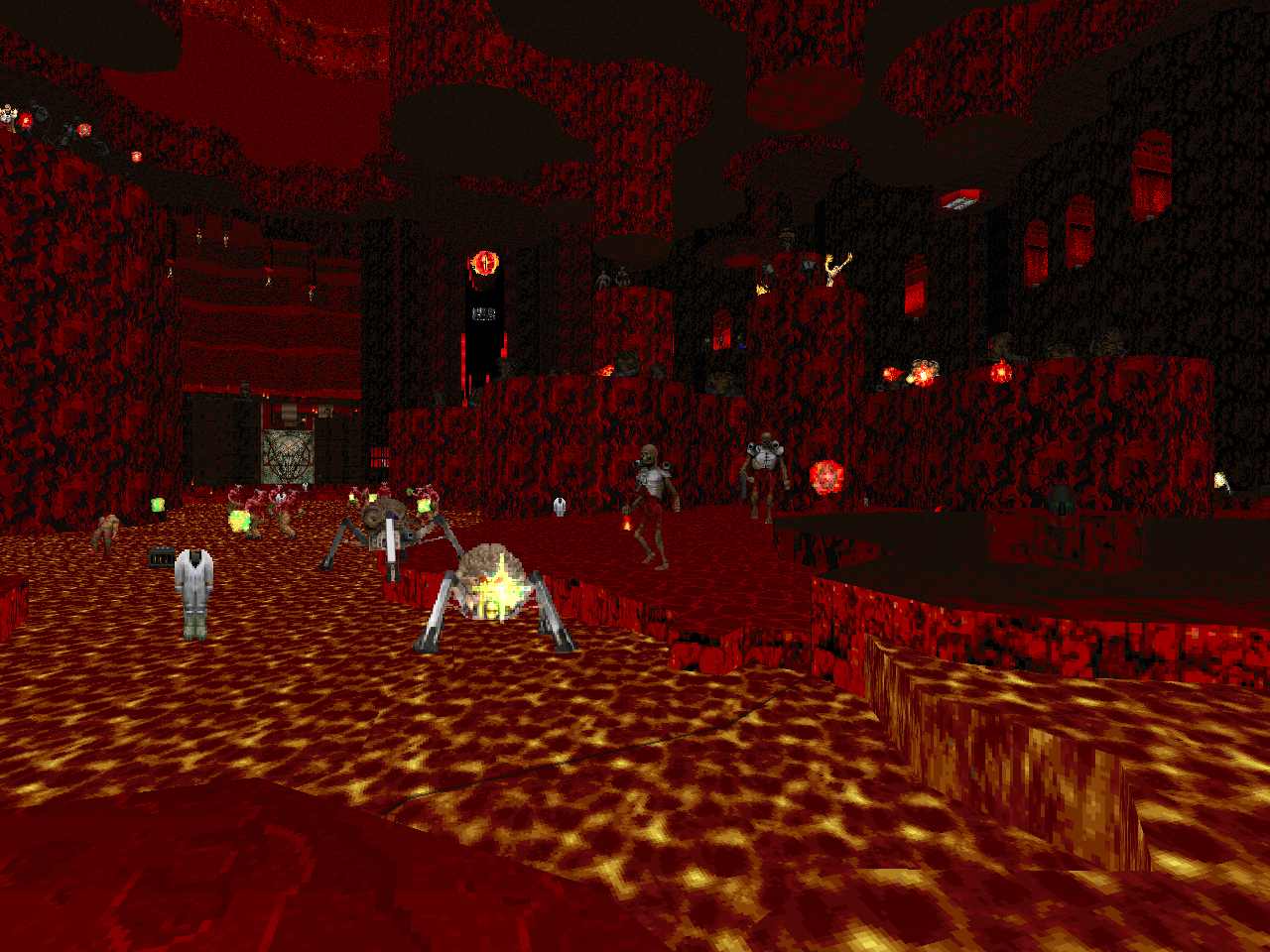
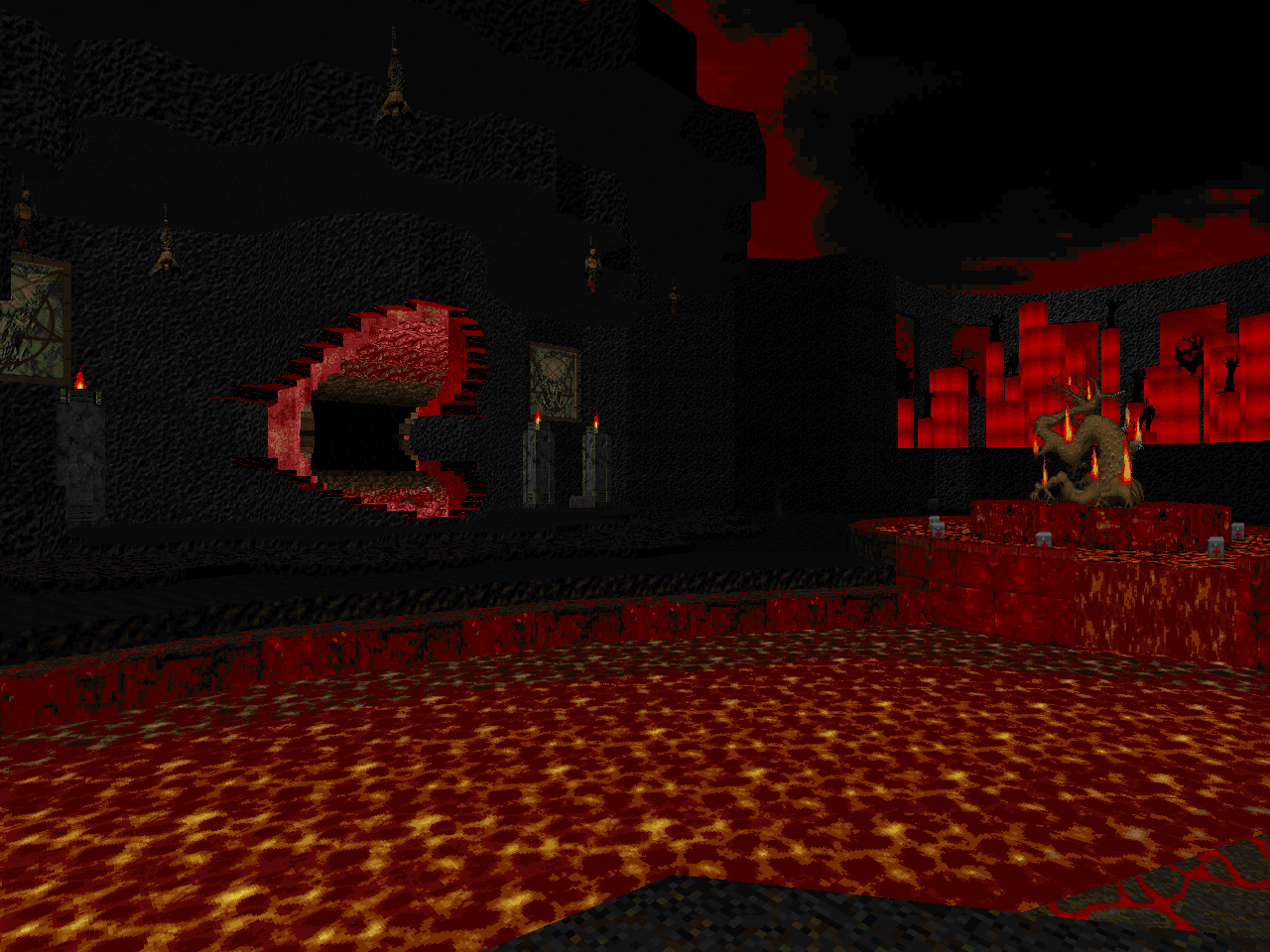
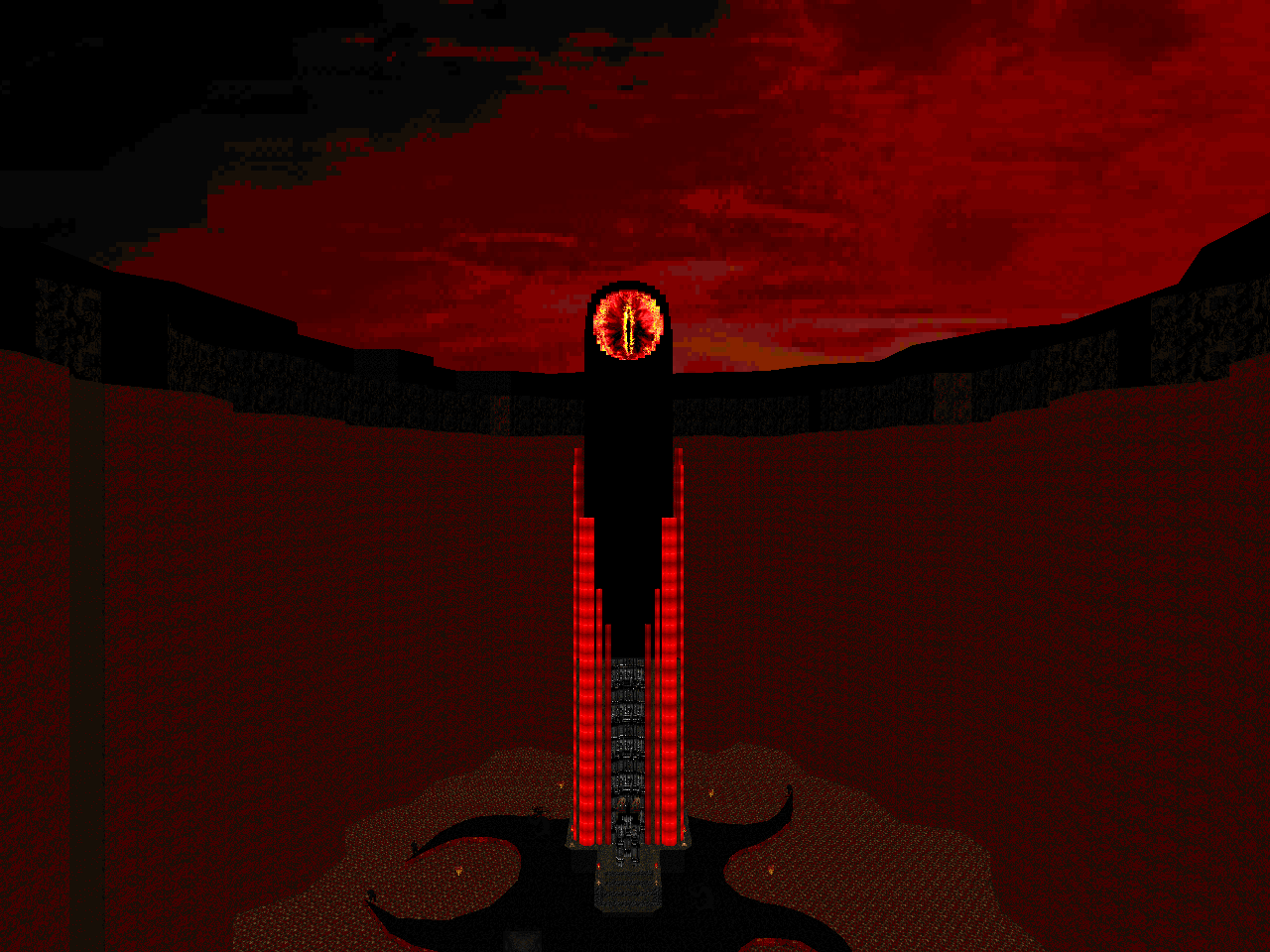
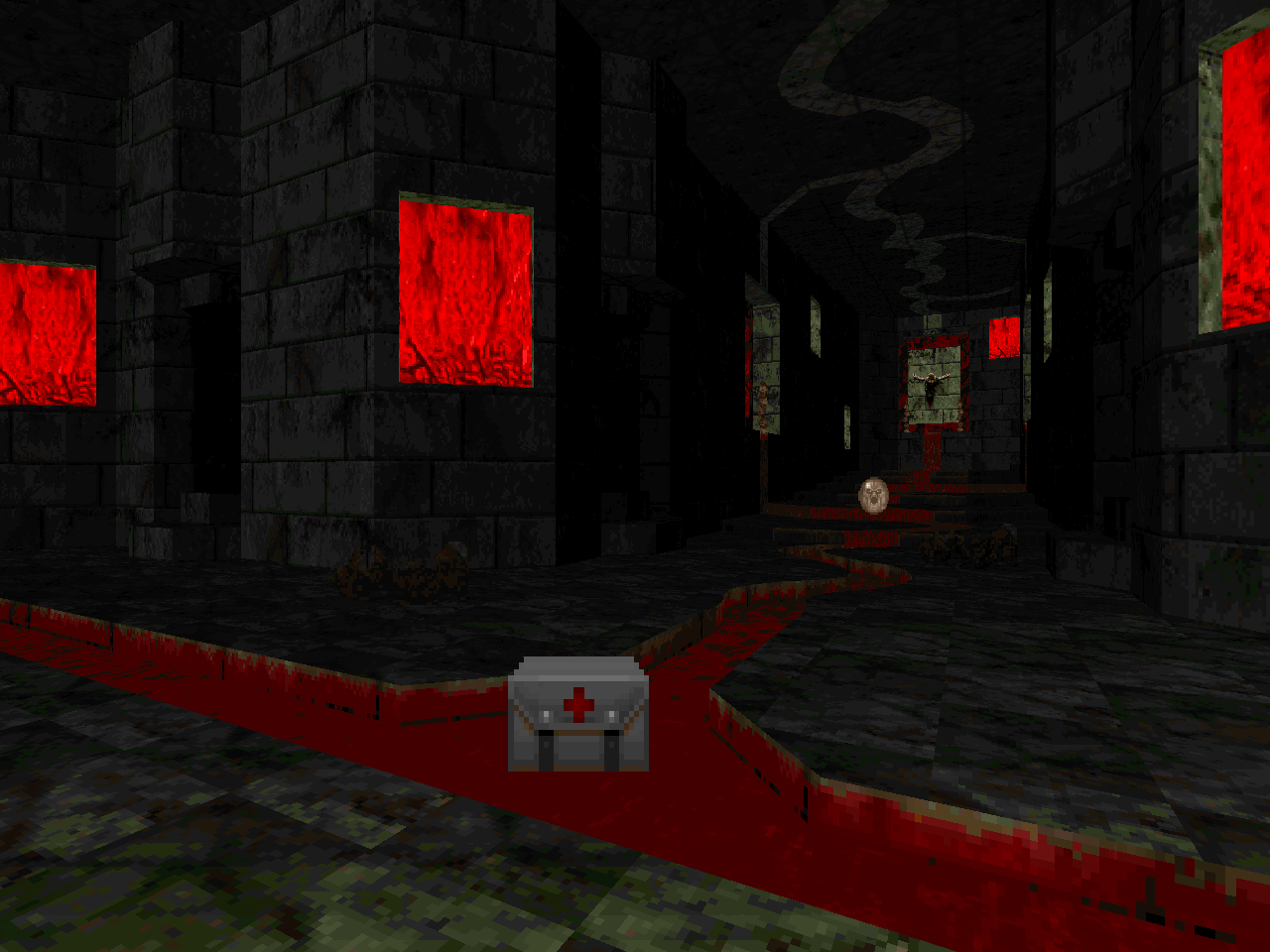
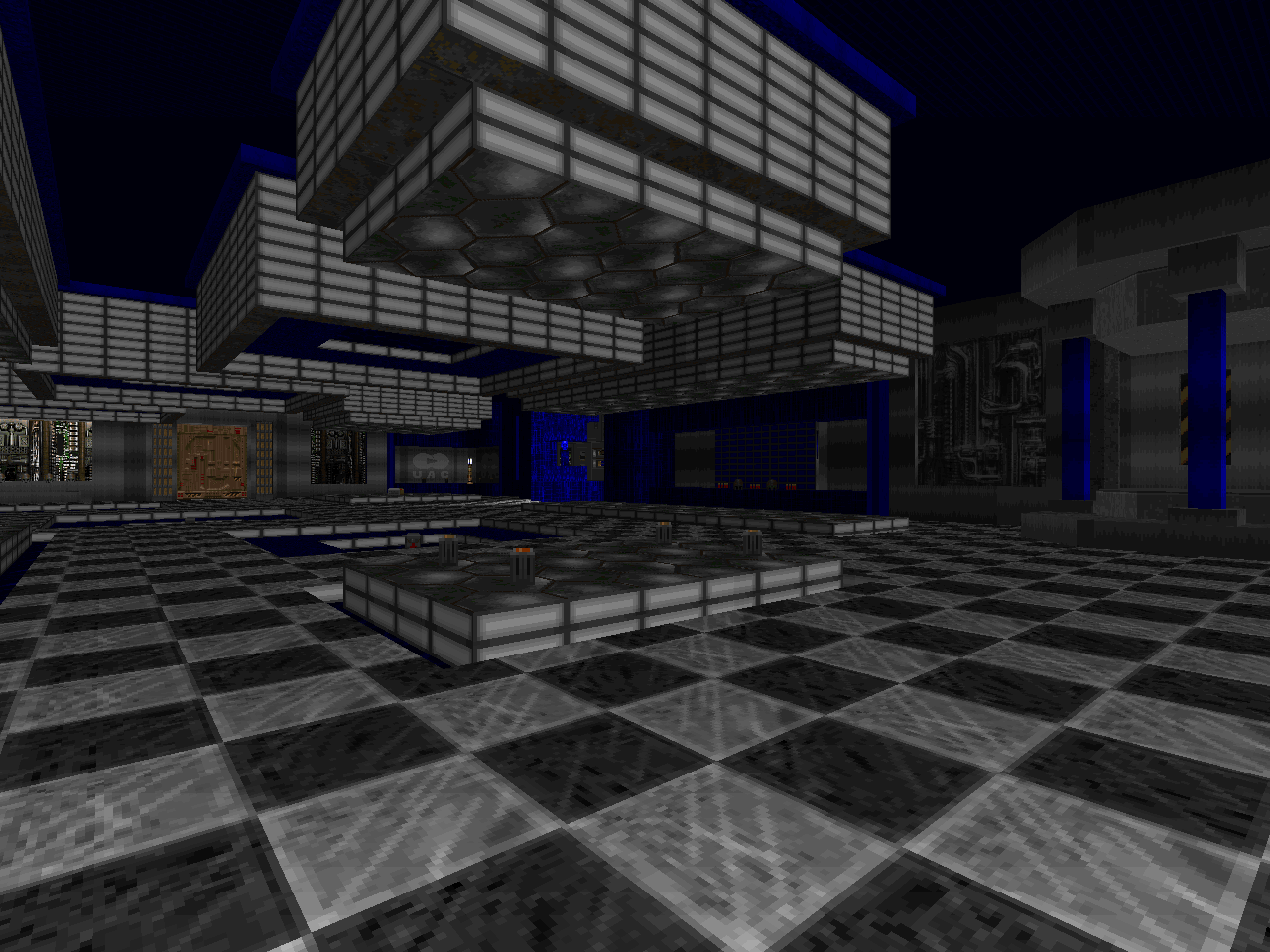
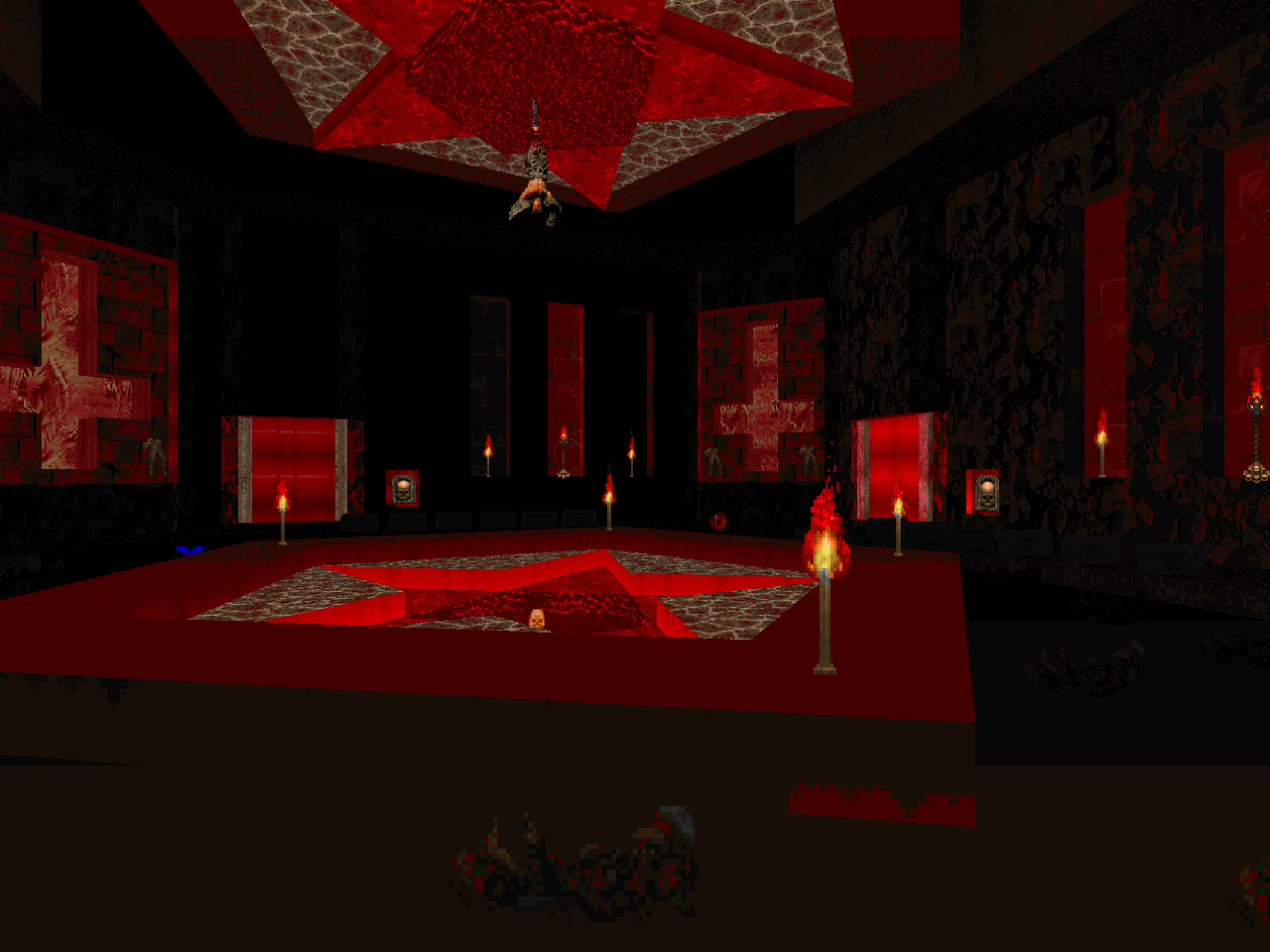
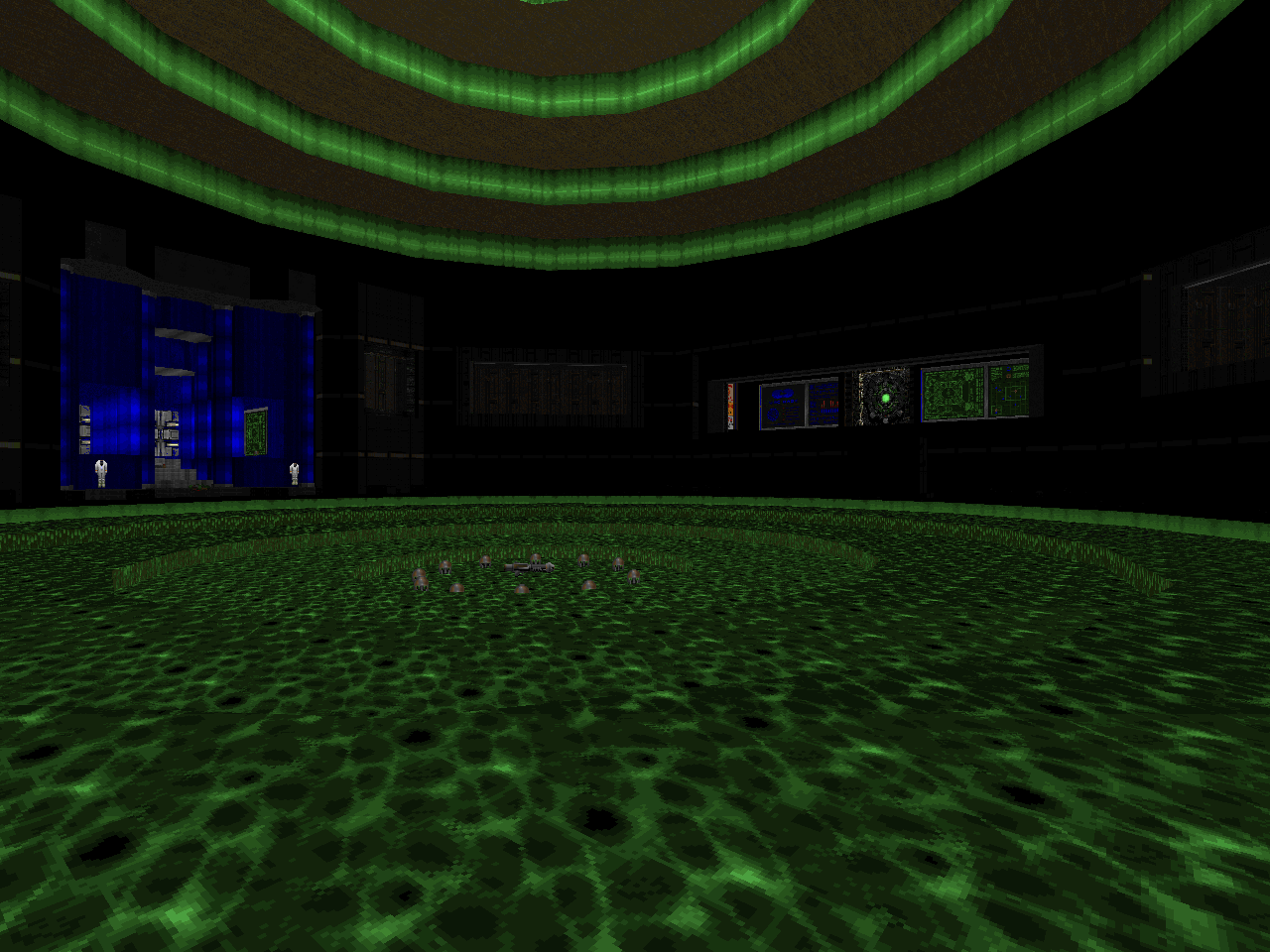
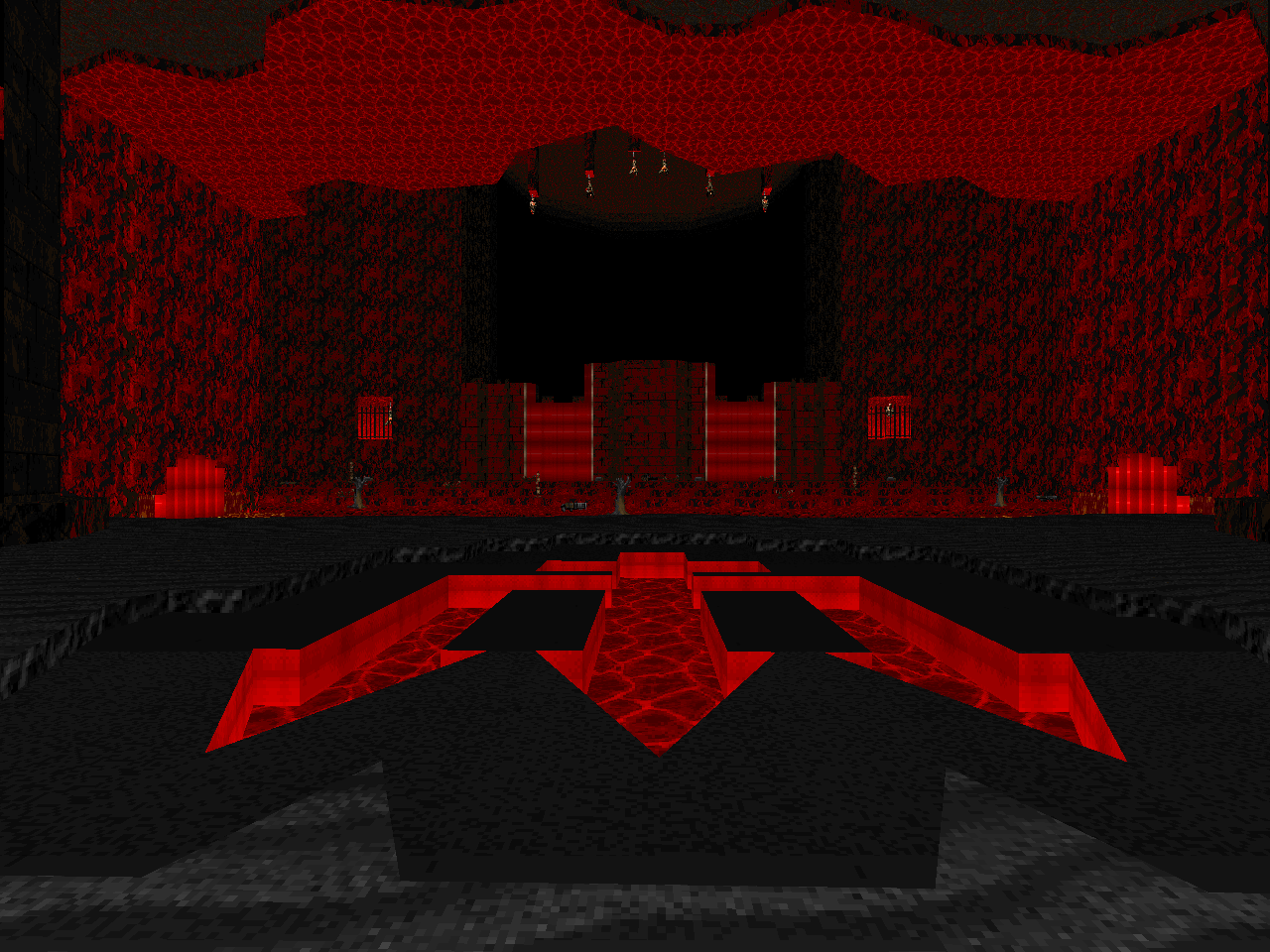
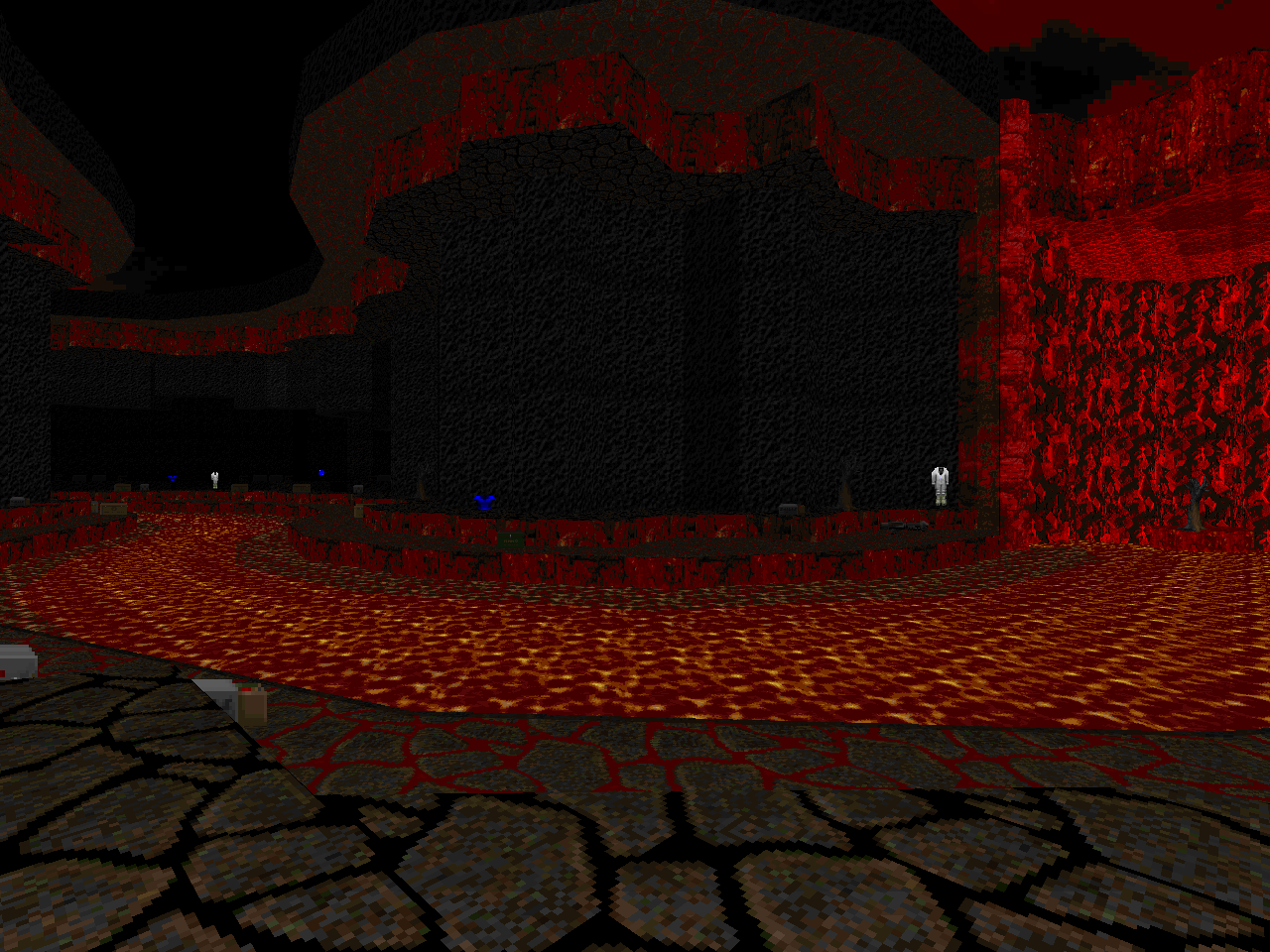
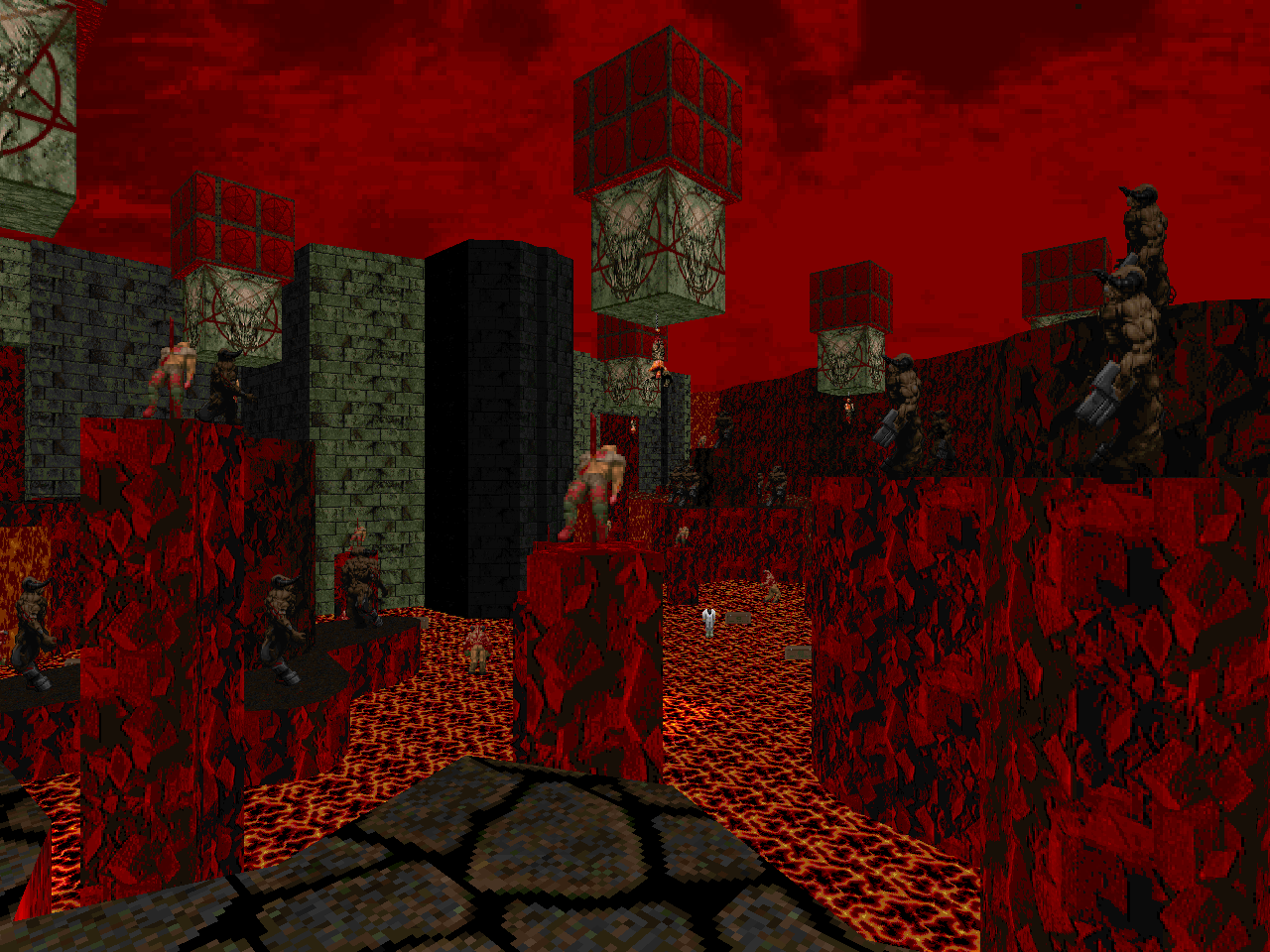
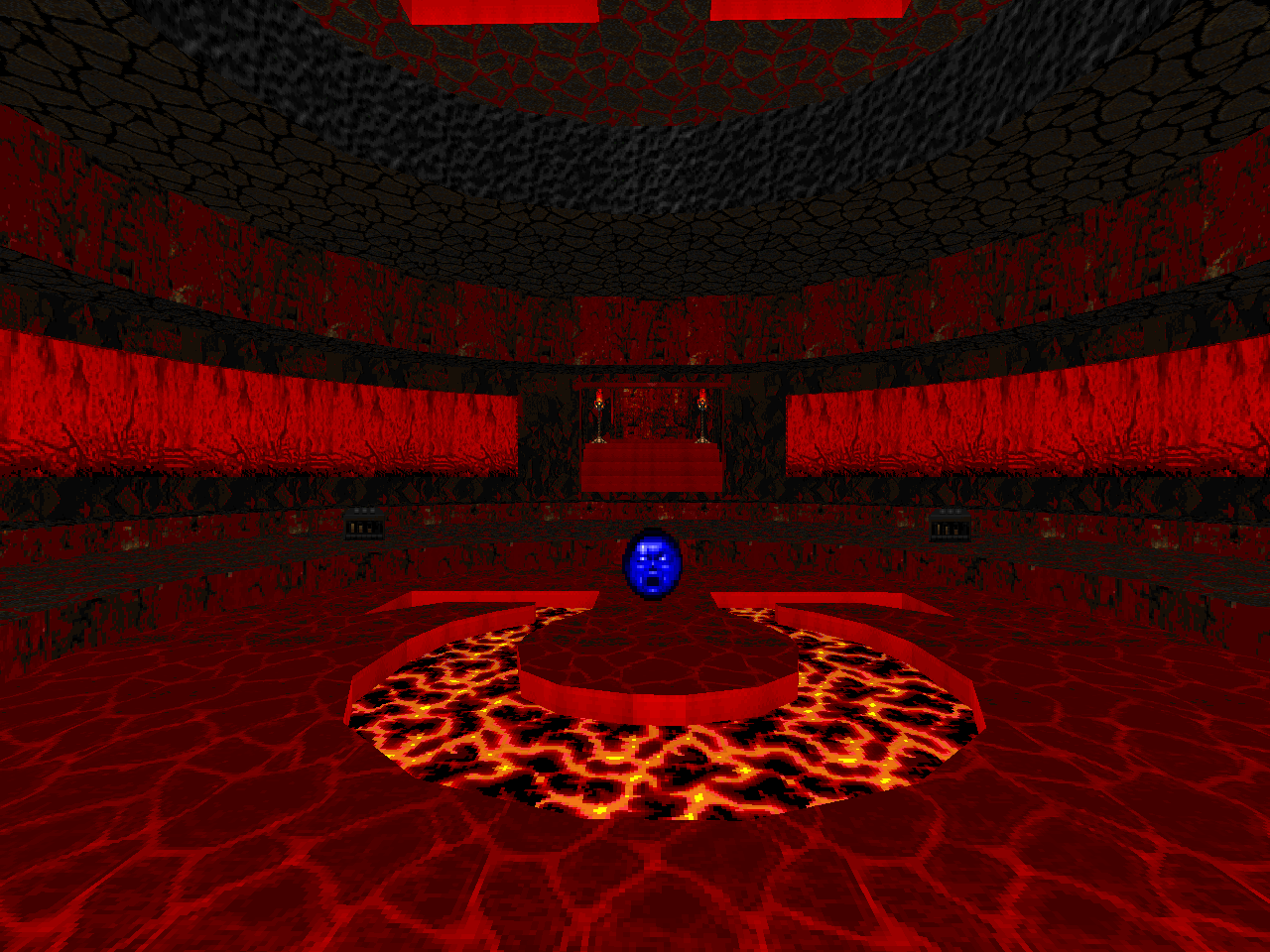
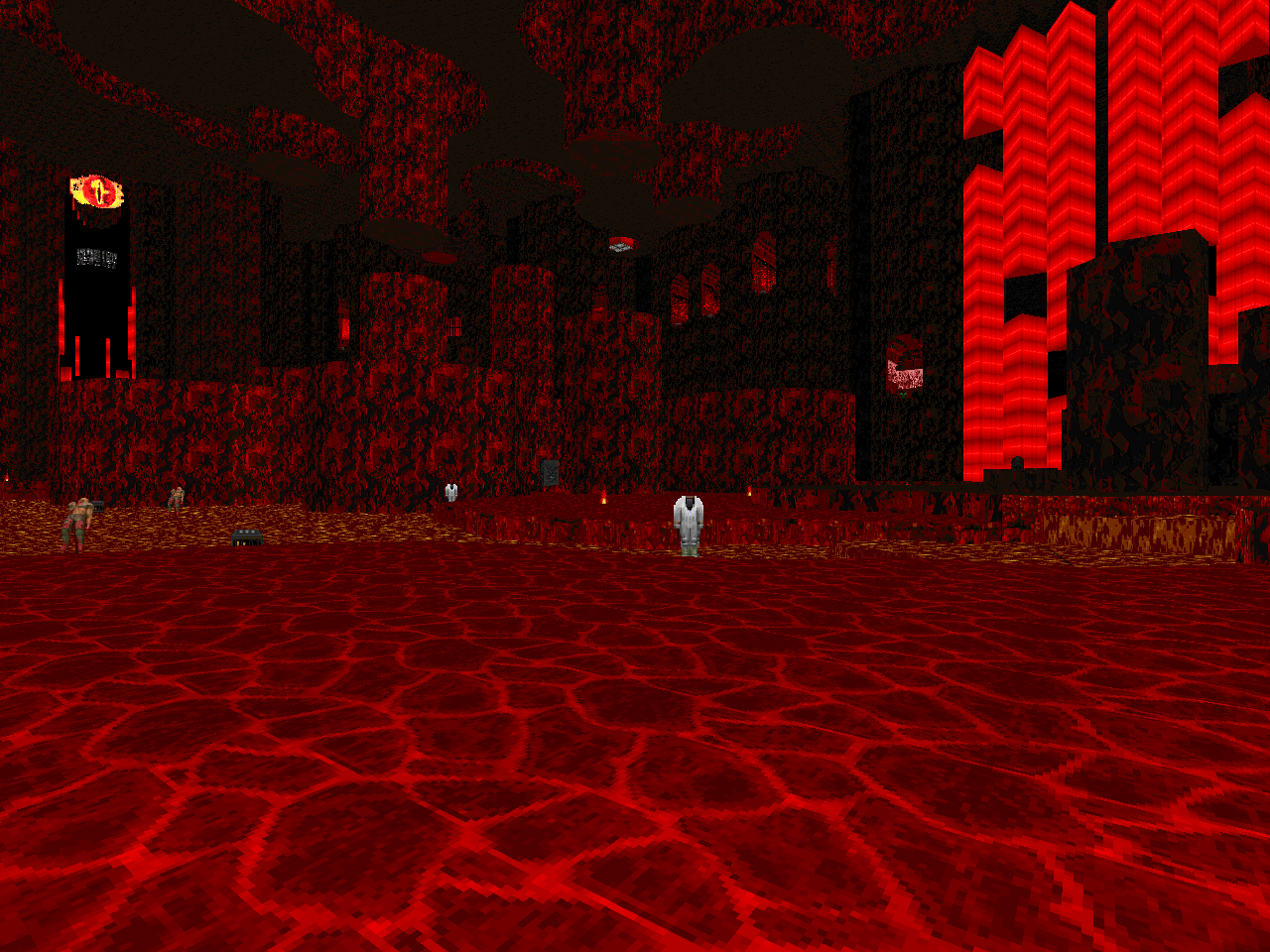
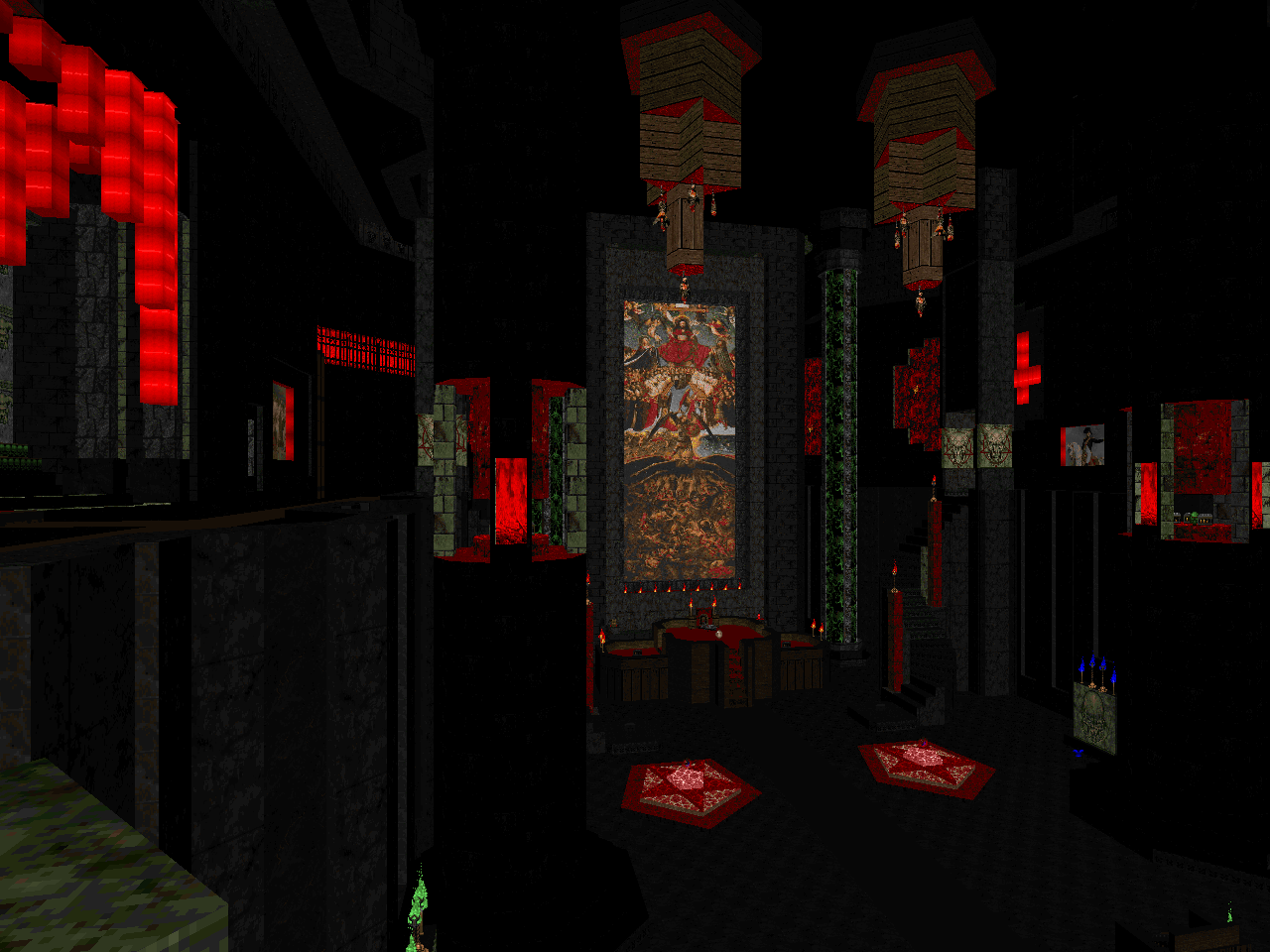
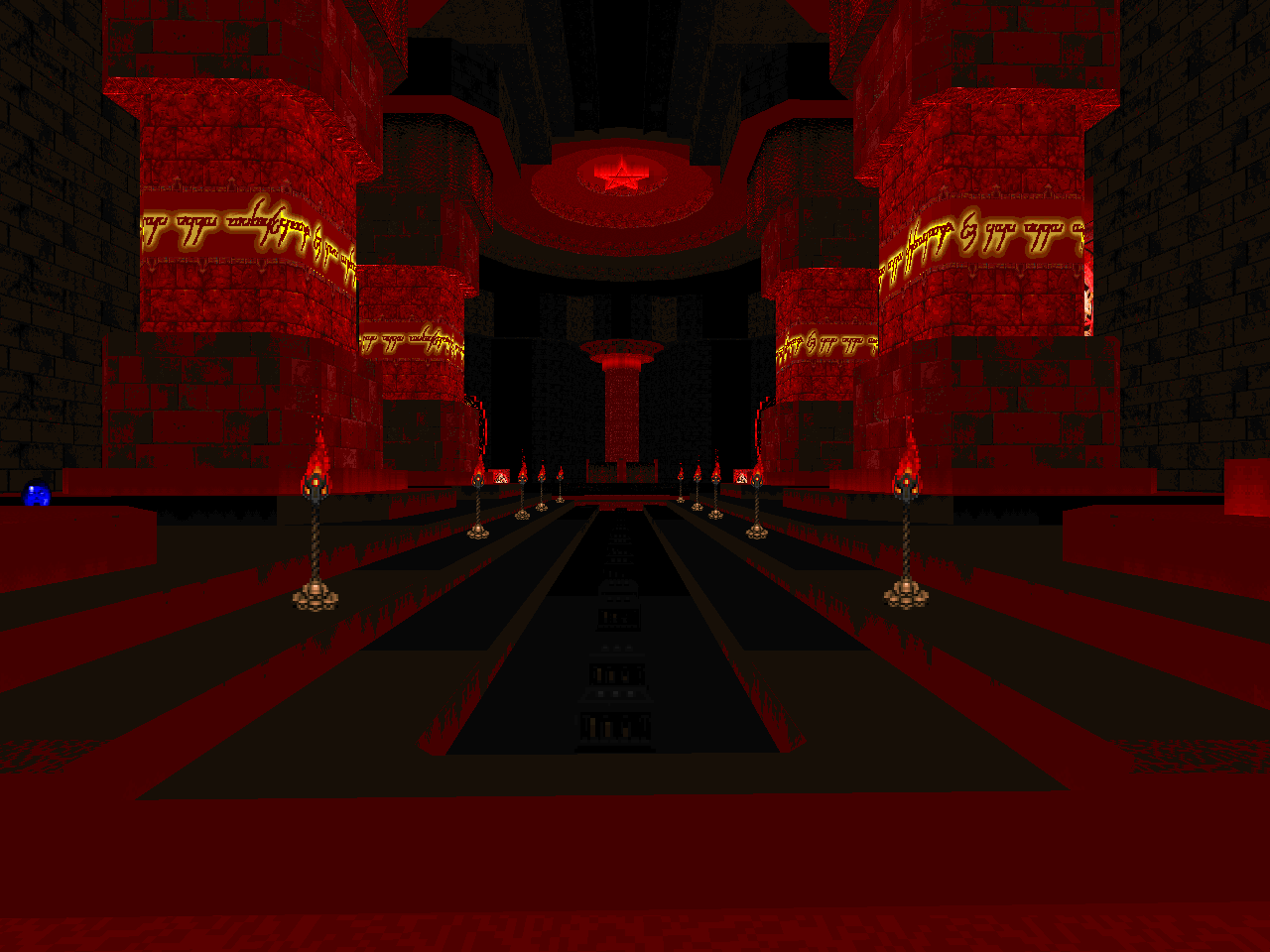
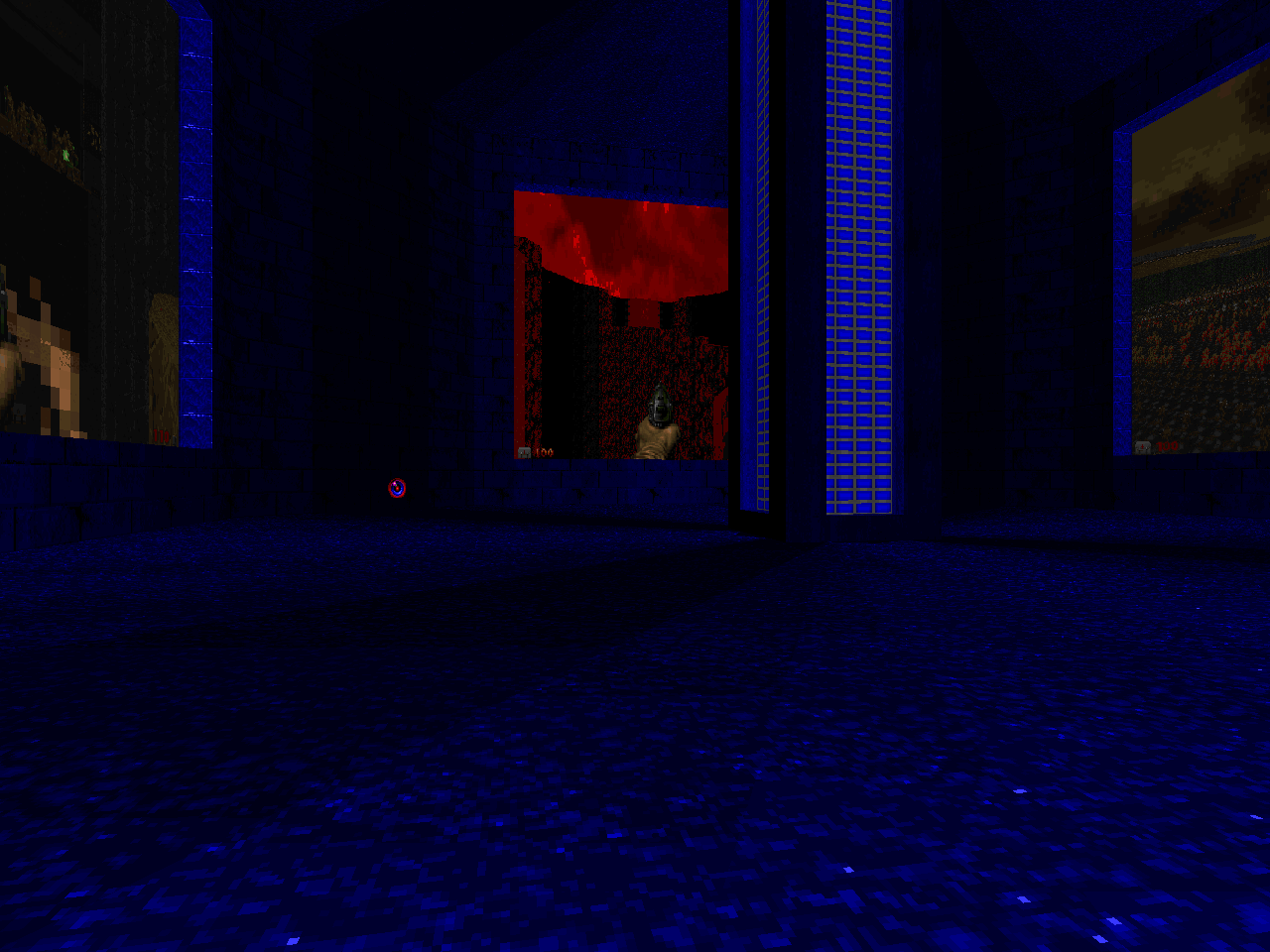

I always recommend people play this via MAP05 as I did. Chopped up, it seems like it would lose a lot of the "holy shit!" factor of just being this massive, seemingly-endless, ever-intensifying adventure. No map I've played has ever given me the "one man takes on the hordes of hell" feeling like this one, and I will love it forever.
ReplyDeleteI can definitely see that.
DeleteDeus Vult I and II are very fun WADs, I cant wait for the Deus Vult II review.
ReplyDeleteIt might be awhile, or it might be sooner than you think!
DeleteA classic map, no doubt, likely very influential at the time. I still can't get myself to stop like this more than DV2, maybe just because it's a finished product, even though DV2 INCLUDES this level no less!
ReplyDelete